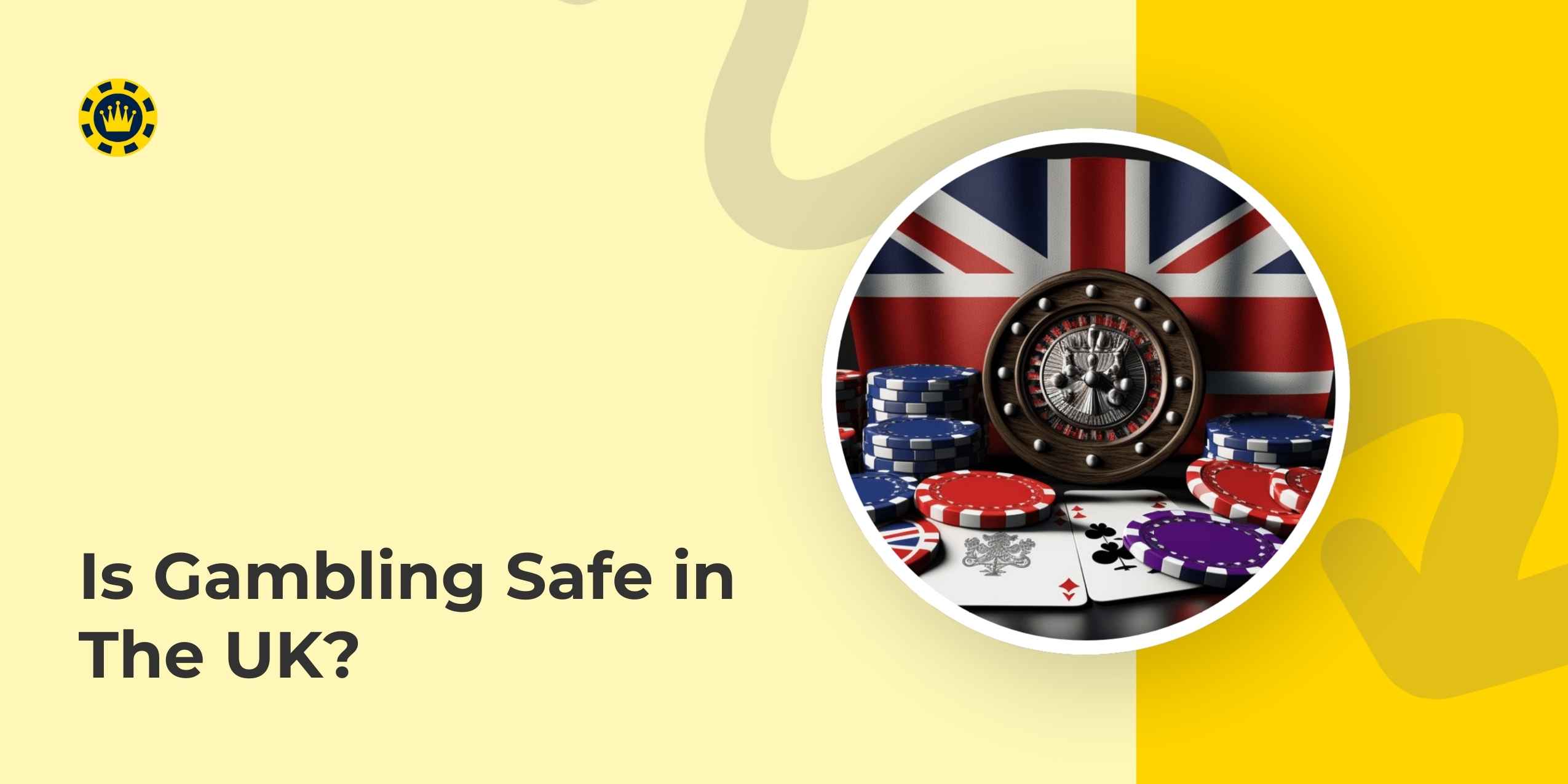Safe gambling in United Kingdom has become a major talking point as betting continues to grow both on the high street and online. Each year, British players spend close to £14 billion, showing how deeply gambling is tied to everyday leisure.
The rise of digital platforms has also raised concerns about security, regulation, and whether current gambling laws in UK are strong enough to protect users. The Gambling Commission plays a central role in this system.
Yet risks remain clear. A recent survey among university students showed that 28% of gamblers were at moderate risk, while 24% displayed problem gambling behaviour.
This article looks at UK gambling regulation, the safeguards available, and ongoing debates like the UK Gambling White Paper, to assess how safe gambling really is for people across the country.
Key Takeaways: Is Gambling Safe In the UK
1. Regulation doesn’t eliminate risk:
Despite strong UK gambling regulations and responsible gambling laws in UK, potential harms include financial problems, mental health impacts, and relationship strain.
2. Safety requires personal responsibility:
Setting limits, using protection tools, and sticking to licensed platforms are essential practices for safer gambling.
3. Support is available:
Seeking help early at the first signs of concerning gambling behavior can prevent more serious problems from developing.
Understanding The UK’s Regulatory Framework
To properly assess the safety of gambling in the UK, we must first examine the robust legal structure and gambling legislation UK that governs the industry.
The UK has developed one of the world’s most comprehensive gambling regulation UK systems, designed to balance consumer protection with commercial freedom.

For a more detailed breakdown of the legal framework, you can see the full overview of UK gambling laws.
The Gambling Act 2005: Foundation of Modern Regulation
The cornerstone of gambling regulation in the United Kingdom is the Gambling Act 2005. This comprehensive legislation established the framework for all gambling activities across the country with three primary objectives:
- Preventing gambling from becoming a source of crime or disorder.
- Ensuring that gambling is conducted fairly and openly.
- Protecting children and vulnerable individuals from harm.
The Act led to the creation of the UK Gambling Commission (UKGC), which serves as the primary regulatory body overseeing all forms of gambling, from traditional casinos to online betting platforms.
Note: In 2023, the UK government published a review of the act, outlining reforms aimed at modernizing gambling laws, especially for online platforms. Proposals included affordability checks, stake limits for online slots, and enhanced player data usage for harm prevention.
Licensing and Compliance: Strict Standards
The UKGC has established one of the world’s most stringent licensing systems. Operators wishing to provide gambling services to UK residents must:
- Obtain appropriate licenses from the Gambling Commission.
- Undergo thorough background checks, including criminality assessments.
- Demonstrate financial stability and integrity.
- Follow strict anti-money laundering rules.
- Prove their commitment to player protection.
- Ensure their games and software meet fairness standards.
Operators must meet financial and legal criteria, including covering the online gambling license cost to operate legally in the UK.
The Commission conducts regular audits and inspections to verify ongoing compliance with these requirements and has the authority to impose substantial penalties for violations, including license suspension or revocation.
Recent Regulatory Developments
The regulatory landscape continues to evolve in response to emerging concerns and technological developments.
Recent changes have included:
- Banning the use of credit cards for gambling transactions by the UKGC.
- Implementing stricter age and identity verification requirements.
- Introducing measures to reduce the intensity of online slot games.
- Creating a confidential service to report suspicious activity in the gambling industry.
- Requiring operators to monitor customers for signs of harmful gambling patterns.
Players also have access to tools that support self-control, such as services showing how to block gambling sites for those who feel at risk.
UK Gambling Regulation and Who Oversees It
The UK Gambling Commission is the main regulator for betting and casinos, ensuring fair play and safe gambling in the country.
While it oversees operators directly, the wider policy framework is shaped by the Department for Digital, Culture, Media & Sport (DCMS), which sets the direction for socially responsible gambling.
The Gambling Commission UK is funded through licence fees, which brought in about £19 million in 2018–19.
What Are Gambling’s Potential Harms?
Despite robust regulation, gambling carries inherent risks that should not be overlooked. These include:

Financial Vulnerability
The most immediate risk is financial loss. While many people gamble within their means, some develop harmful patterns that lead to significant debt, bankruptcy, or the inability to cover essential expenses.
Financial loss is a primary danger, especially considering how much UK people lose in gambling each year. Online gambling platforms make it particularly easy to wager substantial sums quickly, potentially accelerating financial harm.
Mental Health Impacts
Problem gambling often correlates with mental health challenges, including:
- Anxiety and depression
- Stress-related disorders
- Sleep disturbances
- Substance abuse
- Suicidal thoughts (in severe cases)
Research indicates these issues can develop as both causes and consequences of gambling addiction, creating a potentially dangerous cycle.
Relationship Strain
When gambling becomes addictive, it frequently damages relationships. Trust issues emerge when money disappears or debts accumulate.
Family members and friends may experience what experts call “affected other” status, suffering significant emotional and financial impact from a loved one’s gambling behavior.
Higher-Risk Gambling Products
Not all gambling activities carry equal risk. Research suggests certain products present greater potential for harm:
- Fast-paced online casino games with minimal reflection time.
- Fixed-odds betting terminals with high-speed play.
- In-play sports betting encourages continuous wagering.
- Games with “near-miss” features that create illusions of almost winning.
Tips To Gamble Safely On Online UK Casinos
If you choose to gamble in the UK, these practices can help maintain safety:
Verify Legitimate Operators
Always check that the UK Gambling Commission licenses a gambling site. Licensed sites will display their license number, which can be verified on the Commission’s public register. Unlicensed sites lack consumer protections and may engage in unfair practices.
Set Firm Financial Boundaries
Before gambling, determine exactly how much you can afford to lose and set deposit limits that reflect this budget. Never borrow money to gamble, and avoid chasing losses with increased stakes.
Use Available Protection Tools
Take advantage of the safety features offered by activating reality check alerts to maintain time awareness and setting session time limits for online play. Using self-assessment tools to monitor your gambling patterns and considering gambling blocks through your bank can provide additional safeguards.
Recognize Warning Signs
Be alert to behaviors that may indicate developing problems, such as gambling with money needed for essential expenses, feelings of guilt or stress about gambling, lying about gambling activities, difficulty stopping or cutting back, and borrowing money to continue gambling.
Seek Support Early
Don’t wait for gambling concerns to escalate before reaching out. If you feel even slightly uncomfortable about your gambling habits, talk to a trusted friend or family member, or contact support services like GamCare. Early intervention can prevent the development of more serious problems and provide a valuable perspective on your gambling behavior.
It’s also wise to consider how gambling affects your credit score when managing your online activity and finances.
Conclusion: Online Safe Gambling in UK depends on using licensed sites
Gambling in the UK is legal when done through licensed operators, supported by the Gambling Act UK and wider gambling law UK. The system is enforced by the Gambling Commission UK, which grants both physical and online gambling licenses to ensure fair and safe play.
Even with strict oversight, safety depends on individual responsibility. Players should rely only on licensed gambling sites in the UK, keep firm financial limits, and activate the protection tools available on platforms.
For safe online gambling in the UK, awareness is key. Before playing, set clear time and money limits, use responsible-gambling features, and keep the National Gambling Helpline (0808 8020 133) handy for support whenever needed.
FAQs
Online gambling is legal in the UK as long as the operator holds a valid license from the UK Gambling Commission.
You can verify a site’s license by searching its name or license number on the UK Gambling Commission’s public register.
If you’re worried about your gambling habits, it’s important to seek support early through trusted helplines.
UK law strictly prohibits under-18s from gambling, and licensed sites must use robust age verification checks to enforce this.
Even on legal sites, risks include financial loss, emotional distress, and addiction if gambling isn’t done responsibly.


